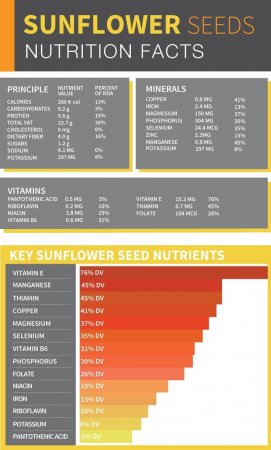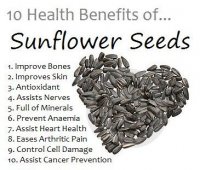Sunflower seeds nutrition facts and health benefits
Sunflower Seeds Nutrition
A ? cup serving of sunflower seeds provides (in value recommended values): 190 calories, 16 grams of fat, 6 grams of protein, and 4 grams of fiber
82% of Vitamin E
70% DV of copper
43% Vitamin B1 (thiamine)
34% of manganese
34% of selenium
33% of phosphorus
28% of magnesium
28% of Vitamin B6
20% of folate
18% of Vitamin B3
Top Health Benefits of Sunflower Seeds
1. Reduces Risk for Heart Disease
The high supply of antioxidant Vitamin E (80% of your daily recommended value in every ? cup of seeds) helps to reduce body-wide dangerous inflammation from leading to various diseases. Vitamin E, also known as gamma-tocopherol, is a powerful antioxidant that is found in nuts and seeds including sunflower seeds.
Researchers now know that high levels of inflammation are correlated with an increased risk for heart disease, but also for stroke, cancer, diabetes, and even serious neurodegenerative disorders like Alzheimer’s and Parkinson’s disease.
Frequently consuming sunflowers seeds has been shown to help balance cholesterol levels, to reduce hypertension, to lower high blood pressure, and to protect against heart disease- all which are possible once inflammation levels are under control.
2. Helps to Prevent Cancer Due to High Antioxidant Content
Studies demonstrate that sunflower seeds are especially useful for preventing cancer through eating a high-nutrient diet. The important range of antioxidants, trace minerals, and other vitamins found in sunflower seeds help to reduce oxidative stress from taking place within the body, which when left uncontrolled contributes to the development of cancer.
Sunflower seeds also contain selenium, an antioxidant that is important for preventing breast cancer. Selenium has also been shown in studies to help with DNA repair and for detoxing the body of harmful, damaged cells. Selenium helps the body to stop the proliferation of cancer cells and to stall tumor growth through apoptosis, the self-destruction of damaged cells by the own body, including those found in cancerous tumors.
3. Supports Thyroid Function Through Selenium
One of the leading causes of thyroid disorders, including hypothyroidism and hyperthyroidism, is a deficiency in the mineral selenium, which sunflower seeds are luckily an excellent source of.
The thyroid gland is responsible for regulating body temperature, heart rate, the production of protein, and controlling the rate of your metabolism, just to name a few functions; therefore a thyroid disorder can show up in many different symptoms (weight gain, fatigue, abnormal body temperatures, etc.) and can be hard to properly diagnose without a blood or urine test.
One of the keys to controlling thyroid disorders naturally- without the use of pharmaceutical drugs- is to include more selenium and iodine in your diet, among other beneficial changes that can be made.
4. Helps Combat Osteoporosis, Bone Loss, and Muscle Cramps
Sunflower seeds provide a high amount of essential trace mineral magnesium, which most Americans are actually deficient in due to eating a poor “standard American diet” low in fresh, nutritious foods. Magnesium plays many important roles within the body: it helps to balance the calcium/potassium ratio within cells, is crucial to overall cardiovascular health and it aids in healthy blood pressure.
It is partially responsible for keeping the skeletal structure healthy and helps to prevent conditions related to loss in bone mineral density like osteoporosis. Additionally it helps with blood clotting as well as bone calcification. Magnesium also helps to reduce chronic migraine headaches, constipation, chronic fatigue, and even symptoms associated with mood disorders like depression and anxiety.
Sunflower seeds are a rich source of B Vitamins, including Vitamin B5, which is also known as pantothetic acid. Like the other types of B-vitamins, Vitamin B5 plays an important role in energy metabolism, since it acts as a coenzyme involved in energy-producing chemical reactions within the body.
5. Balances Blood Sugar Levels and Helps Ward off Diabetes
A diet rich in all types of nuts and seeds has been shown to reduce hyperglycemia and to help balance blood sugar levels. This decreases the chance of developing metabolic syndrome including diabetes or insulin resistance. We know from looking at the diet of populations who traditionally have eaten a high amount of seeds that the compounds found in seeds help to combat diseases related to uncontrolled blood sugar levels.
6. Improves Skin Health
Studies have shown that antioxidant Vitamin E is especially useful for maintaining youthful, strong, healthy skin. Sunflower seeds contain Vitamin E in addition to essential fatty acid lipids that help keep skin hydrated and free from sun and pollution damage. Studies have shown that in controlled trials using animals, both sunflower seeds and flax seeds are able to keep animal coats and skin healthy and free from signs of damage even as the animals age, and believe that the same benefits are achieved in the skin and hair of aging humans.

